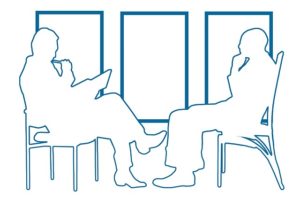In the last post, we listed and discussed some of the questions that you’re likely to be asked as a foreign medical graduate when you interview for a US medical residency program. In this post, we’re going to tackle the opposite issue–that is, the questions you should be asking during the interview days. Over the course of the one or two days that make up a program’s interview schedule, you will have lots of opportunities to find out more about the program and determine whether or not it’s a good fit for you.
Asking questions during the interview days is extremely important because it can help you when you’re preparing your Rank Order List (ROL) in the winter. By learning as much as you can about a program, you can make sure that all of the schools on your ROL offer the professional environment and life experience you’re looking for, and you can make sure that the order you choose is consistent with your preferences. Therefore, during the interview days, you need to be ready to ask the right questions of the right people at the right time. That way, you can make the most of your interview experience and come away with a strong idea of where a program might fit on your ROL.
Questions During the Formal Interview
It’s common for US medical residency interviewers to save one of the toughest interview questions for last: “Do you have any questions for me?” Although you have a variety of options for how to answer, the correct response is definitely not “No.” When you’re asked this question, you have the chance to make a good impression and learn more about the program. Because this is part of your formal interview, you want to show that you’re well-informed about the program and eager to get your interviewer’s unique perspective. Thus, you should avoid asking for basic information about the program that you can find online or that was discussed during an information session. Instead, ask a question that has a truly meaningful answer and that reminds the interviewer of something about who you are as a candidate (without seeming too self-centered). For instance, some appropriate options include:
- What would you say makes this program stand out the most from other programs in my chosen specialty area?
- What do you like most about working in the [insert your specialty area] department at this institution?
- Can you tell me more about the research opportunities in my specialty area of interest? (When asking this question, it can be helpful to mention a specific research project or group that you’ve looked into as you’ve been considering the program.)
- How does your experience working at this institution compare to your experiences working abroad? (Of course, this question should only be asked of an interviewer if you know they have international medical experience like you do!)
Questions During Informal Meals with Residents and Faculty Members
Many programs include informal meals or coffee breaks with residents and/or faculty members. These events provide candidates with an excellent opportunity to have candid conversations about what your work in the program would really be like. In an informal setting, you can ask residents about their daily schedule and obligations, their work-life balance, the housing and transportation options in the city, and what they like to do with their time away from work. If one of the residents or faculty members is a foreign medical graduate, you might also ask them about their transition to the United States and why they chose this program and location over their other options.
No matter what, remember that it’s best to phrase all questions in a positive way, because you’re still being evaluated, and you want to make a good impression. For instance, asking the question, “What has been your greatest challenge as a medical resident?” sounds much better than, “What sucks the most about being a resident here?” In these conversations, you should also try to avoid gossipy questions about people you might have met during the interviews– especially since the answers won’t really make a difference when it comes to constructing your ROL in the winter.
Questions After Information Sessions
Most programs include an Information Session, often at the beginning of the interview schedule, to cover the basic components of the program and logistical topics like salary and program size. Often, the speaker will open up the floor for questions at the end. This gives you the opportunity to ask any clarifying questions if you are confused about something that was discussed. However, if your question could easily be found in the information packet, you might just want to jot it down and find the answer after the interview days are over. Alternatively, if the question is only pertinent to your individual situation, you may want to follow up with the speaker after the presentation is over, instead of posing your question in front of the whole group of candidates.
For more help with the interview process (or any other aspect of landing a US medical residency), contact FMG Portal today!

